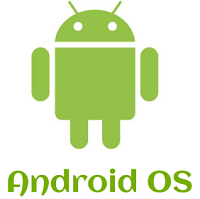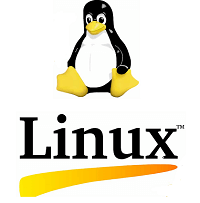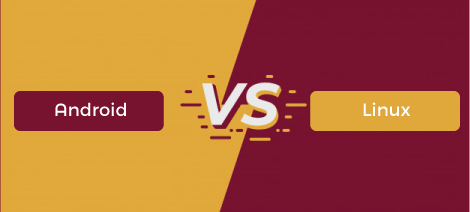Difference between Android and Linux
Most people believe Android and Linux to be operating systems. Android OS is for mobile devices, whereas Linux OS is for servers and desktop computers. In terms of Android and Linux, the Linux kernel is the most popular operating system, while the Android framework is built on top of the Linux kernel. All Android devices use the Linux kernel, but Android is not present in every Linux device. As a result, the Linux kernel is the foundation for Android development.
In this article, you will learn the difference between Android and Linux. But before discussing the differences, you must know about Android and Linux.
What is Android?

Google’s Android operating system is a mobile OS. It is based on a modified Linux kernel version and other open-source apps. It is intended for touch screens and mobile devices like tablets and smartphones. It was created in C, Java, C++, and other programming languages. It is the most widely used OS in the world. Google released the first version of Android in 2008. Android 12.0 is the most recent stable version. The full Java programming language is supported by Android development, and other API and JSE packages are also not supported. It is offered completely free of cost.
Advantages and Disadvantages of Android
There are various advantages and disadvantages of Android. Some advantages and disadvantages of the Android are as follows:
Advantages
- It is very customizable and may be transformed into anything.
- It provides an open-source platform to the developers.
- It is very cost-effective.
- Any new application may be published without being reviewed.
- It has easy access to the Android application market.
Disadvantages
- It provides a high gadget fragmentation.
- Various apps may contain viruses.
- It features a complicated layout, which makes coding tough.
- Fake and low-security applications may be installed, which gather your information without your knowledge.
What is Linux?

Linux is a collection of free and open-source Unix-like OS. Linus Torvalds created and designed Linux. It is a packaged Linux distribution. Among the most popular Linux distributions are Debian, Fedora, and Ubuntu.
It was mostly written in the C language. The monolithic kernel was utilized in the development of Linux. Linux distributions are aimed toward cloud computing, embedded devices, personal computers, servers, computer networks, and supercomputers. The first Linux version was released in 1991. The latest Linux version for desktop computers is Linux 5.6.
The General Public License controls the usage of Linux, an open-source operating system. Anyone can run, analyze, alter, and disseminate the raw data as long as they do it by the license. They can increase sales of their customized script.
Linux has grown to be the world’s most popular open-source development project. Amateur and professional developers worldwide contribute to the Linux kernel, creating improvements, resolving bugs and repairing potential vulnerabilities, and suggesting new ideas while remaining supportive.
Advantages and Disadvantages of Linux OS
There are various advantages and disadvantages of the Linux OS. Some advantages and disadvantages of the Linux OS are as follows:
Advantages
- Linux is an open-source OS that is available for free to users. Unlike other OS, Linux does not charge you for receiving program requests and transmitting them to hardware. Linux’s source code is also open for viewing and changing by anyone. If you have the necessary skills and interests, you may also contribute your expertise and free time to the Linux community.
- Linux OS installation is a simple and quick process. It is simple to download and install from the internet. Furthermore, it is compatible with older hardware, so there is no need to worry about device compatibility.
- The first and most important reason people choose Linux is its high level of security. It prevents malware from spreading and makes the platform safer. Programmers worldwide can readily uncover vulnerabilities, exploits, and other risks because its code is publicly available. Furthermore, the users have IDs and passwords, and their access is limited. In addition, downloading malicious attachments unintentionally is easy on other operating systems, and all it takes is a double click. However, additional steps are required with Linux, such as storing it before execution and seeking permission to open it.
- If you use the Windows operating system, you may have noticed that your system slows down when you download huge files or utilize various tabs. Although, there is no such problem with Linux. It encourages multitasking, which means you may carry out multiple tasks simultaneously without experiencing a delay in response. Furthermore, several processes can share CPU cores/threads and other system resources.
Disadvantages
- You may easily customize Linux once you’ve gained hands-on expertise with it. However, getting started might be challenging, especially if you are a Windows user or have little to no technical knowledge. Furthermore, different Linux distributions have varied learning curves. Some are suitable for newcomers, while others can frustrate even experienced Linux users. So, if you intend to use Linux as the OS for your device, be prepared to invest time in learning it well.
- Drivers are frequently included in operating systems that allow access and control of hardware functions. However, the concept of drivers is different in Linux, and they are incorporated into the kernel. Even though many drivers are preloaded, Linux may not have a driver for every piece of hardware or device it comes across. It may lead to compatibility issues. As a result, users must install their drivers where hardware is not detected or does not function properly.
- Another disadvantage of having the smallest market share is a lack of technical assistance for Linux. Service centers for Windows and MacOS are easily accessible, but for Linux, you must frequently go the extra mile. You’ll have to look for options online because you won’t be able to seek support offline. The Linux community may help you, but getting immediate assistance or assistance from professionals cannot be assured.
- If you are a serious gamer, you should reconsider your operating system selection. If you frequently play games on your device, Linux is not the best option.
Key differences between the Android and Linux OS

Here, you will learn the various key differences between Android and Linux. Various differences between Android and Linux are as follows:
- Android is an open-source OS that was first developed by Android Inc. and is now owned by Google. On the other hand, Linux is the kernel developed by Linus Torvalds under the GNU project.
- Android is intended for mobile and smart devices. On the other hand, Linux is intended for full-fledged desktop PCs and supercomputers.
- Embedded Linux systems use solid-state memory devices like NOR for code execution and NAND for storage. In contrast, regular Linux systems use the EXT journaling file system to provide a resilient file system. On the other hand, Android systems use flash memory for storage-related requirements.
- Android only supports only two major architectures: x86 and ARM. On the other hand, Linux supports multiple architectures.
- Linux is a popular operating system, whereas Android is a framework that runs on top of the Linux kernel.
- Android was first released in 2008. On the other hand, Linux was first released in 1991.
- The kernel type of Android is directly based on the Linux framework. On the other hand, the kernel type of Linux is Monolithic.
- Android released its updated version within a few months. On the other hand, Linux released its updated version within a 5-year variation.
- Android is written using C, C++, Java, and other languages. On the other hand, Linux is written mainly using C and assembly language.
Head-to-head comparison between the Android and Linux
Here, you will learn the head-to-head comparisons between the Android and the Linux OS. The main differences between the Android and the Linux OS are as follows:
| Features | Android | Linux OS |
|---|---|---|
| Definition | It is an open-source OS that was first developed by Android Inc. and is now owned by Google. | It is the kernel developed by Linus Torvalds under the GNU project. |
| Released | Android was firstly released in 2008. | Linux was firstly released in 1991. |
| Kernel Type | The kernel type of Android is directly based on the Linux frame. | The kernel type of Linux is Monolithic. |
| Languages | Android is written using C, C++, Java, and other languages. | Linux is written primarily using C and assembly language. |
| Exactly | It is a framework that runs on top of the Linux kernel. | Linux is a popular OS. |
| Platform Availability | It is an open-source OS. | It is also an open-source OS. |
| Library | Android uses only the C library. | Linux OS uses the GNU C library. |
| Uses | Android is mainly designed for mobile and smart devices. | Linux is mainly designed for full-fledged desktop PCs and supercomputers. |
| Market Footprint | Android is larger than Linux. | Linux is less than Android. |
| Architecture Supported | Android only supports only two major architectures: x86 and ARM. | Linux supports multiple architectures. |
| Storage and Execution | Android uses Flash memory to meet storage-related requirements. | Embedded Linux systems use solid-state memory devices like NOR for code execution and NAND for storage. In contrast, regular Linux systems use the EXT journaling file system to provide a resilient file system. |
| Uses of Virtual Machines | It uses the Dalvik virtual machine to execute apps. Several mobile developers use JVM to execute it. | Linux does not use virtual machines in its execution. |
| Schedule of Release | It released its updated version within a few months. | It released its updated version within a 5-year variation. |
Conclusion
Android is an open-source OS that runs on top of the Linux kernel distribution and is used in mobile and tablet devices. Android is important on mobile devices, but it is only a framework that runs on top of the Linux kernel. In contrast, Linux is a legacy operating system that is ideal for desktop and system users.
